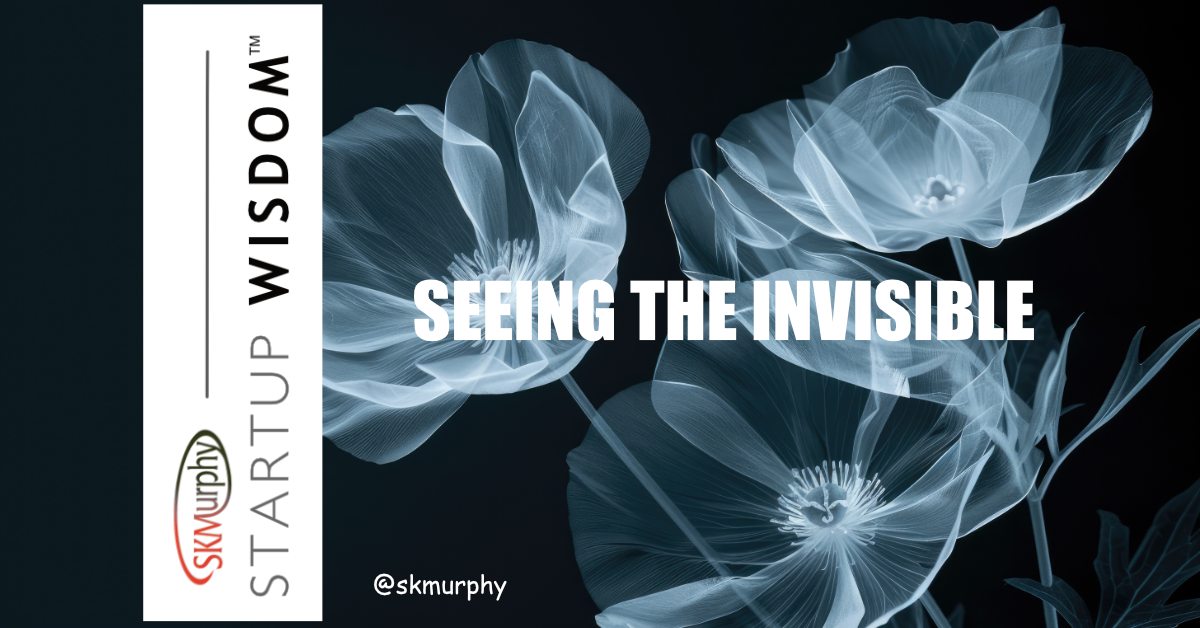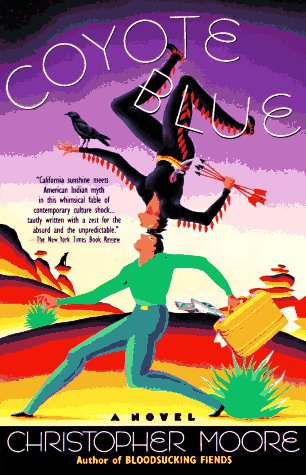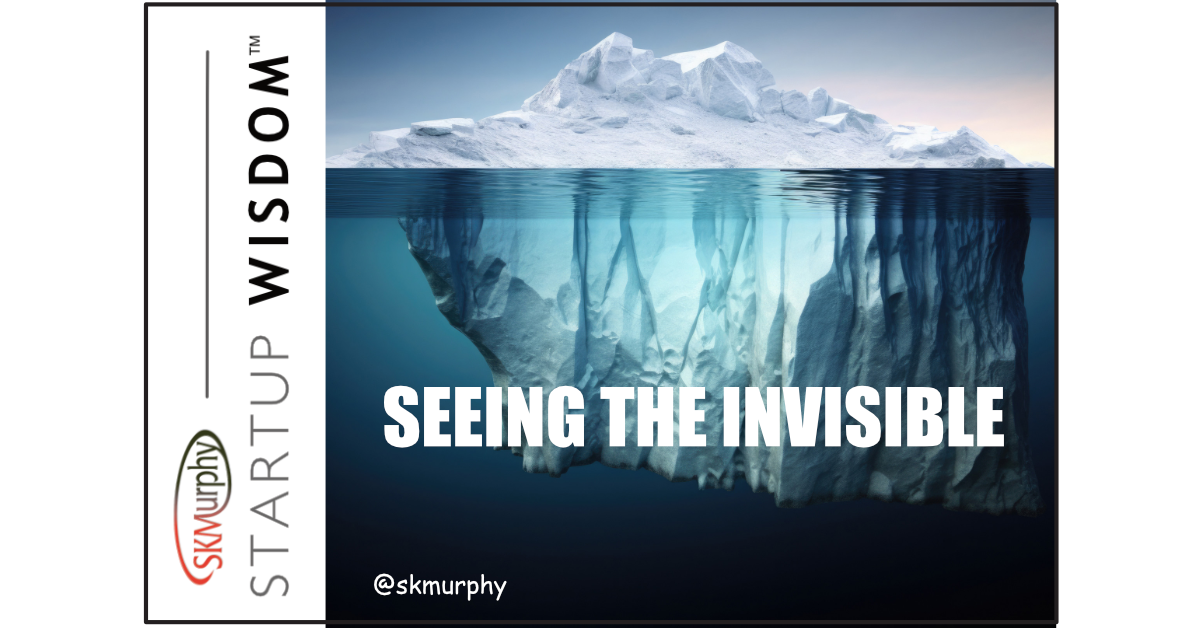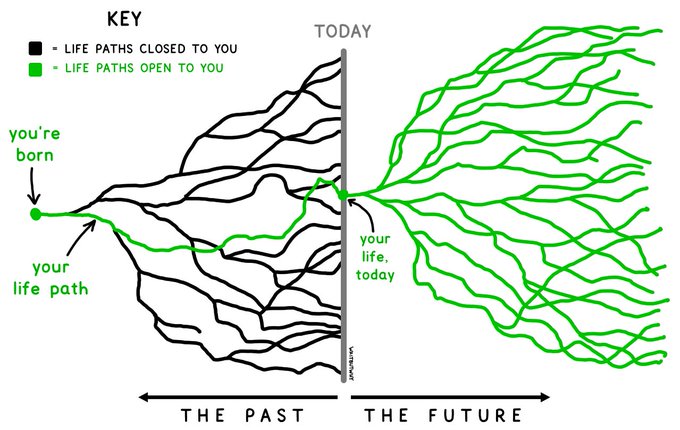A collection of quotes for entrepreneurs curated in May 2025 around a theme of seeing the invisible and uncovering the obscure.
Quotes For Entrepreneurs Curated in May 2025
I curate these quotes for entrepreneurs from a variety of sources and tweet them on @skmurphy about once a day where you can get them hot off the mojo wire. At the end of each month I curate them in a blog post that adds commentary and may contain a longer passage from the same source for context. Please enter your E-mail address if you would like to have new blog posts sent to you.

My theme for this month’s quotes for entrepreneurs is seeing the invisible and uncovering the obscure. Entrepreneurs must infer, intuit, or detect what’s happening behind the scenes. They can use a telescope, microscope, strobe, or a time-lapse camera. Understanding what scaffolding was needed to create a system but is no longer part of it helps entrepreneurs bootstrap. We can only detect a limited portion of the spectrum; we must use other methods to discern the infrared, ultraviolet, radio waves, and electromagnetic fields. We have blind spots when engaging with prospects, supporting customers, and collaborating with team members or partners. A different but related skill to seeing the invisible is to see what’s missing or what should have happened but did not. I blogged about that skill in “See What’s Missing: Careful Observation Key To Success.”
+ + +
“It is only with the heart that one can see rightly; what is essential is invisible to the eye.”
Antoine de Saint-Exupery in The Little Prince
+ + +
“There is a thing that happens to you every day; you will not say that you are not familiar with this fact. You have slept, it is morning, you open your eyes, your drawn shades permit a gleam of dawn to penetrate your bedchamber; around you you see nothing but four walls and the empty air. All at once a ray of the rising sun passes through a slit in the shutter, and you perceive a world. In this sudden whiteness you distinguish myriads of objects in suspension, going and coming, revolving, mounting, descending, entering the brightness, plunging into obscurity,—and you never suspected the existence of all this; you see the immensities of the dust specks, this air that you thought empty was peopled. Behold the invisible become-visible.”
Victor Hugo in “Victor Hugo’s Intellectual Autobiography” Chapter “Life and Death”
+ + +
“I like music because it’s the only invisible art form.”
Sean Lennon
+ + +
Image by Tim Urban who observes, “We think a lot about those black lines, forgetting that it’s all still in our hands.”
While choosing a path has an opportunity cost, it also enables downstream options. We tend to focus on paths we have foreclosed and neglect the wealth of options still available–and now available.
+ + +
“Therefore if a man look sharply and attentively, he shall see Fortune; for though she be blind, yet she is not invisible.”
Francis Bacon
+ + +
“Biology is a “hard onion” that needs to be peeled away layer-by-layer. We use our current knowledge to invent new tools, then use those tools to do experiments, gain new knowledge from those experiments, and then invent new tools. So why might [AI] be unable to cure cancer? Because perhaps it’s not possible to cure cancer right now. New knowledge and new tools are needed, and both of these depend on the other. Probably the best [AI] can do is accelerate that invention loop.”
Dynomight in “Smart“
I included this because the invention loop model is a accurate representation of the scaffolding Science needs to be able to make new observations, experiments, theories, discoveries, inventions, and innovations.
+ + +
“A man is not idle because he is absorbed in thought. There is a visible labor and there is an invisible labor.”
Victor Hugo
Understanding a prospect’s cognitive model for task or a process takes patience and conversation, it may leave few artifacts but is a barrier to adoption when misunderstood or poorly comprehended.
+ + +
“A lot of people use collaborative technologies badly, then abandon them. They aren’t ‘plug-and-play.’ The invisible part is the social skill necessary to use them.”
Howard Rheingold
+ + +
“A man’s felicity consists not in the outward and visible blessing of fortune, but in the inward and unseen perfections and riches of the mind.”
Thomas Carlyle
+ + +
“Mathematical science shows what is. It is the language of unseen relations between things. But to use and apply that language, we must be able fully to appreciate, to feel, to seize the unseen, the unconscious.”
Ada Lovelace in a letter to Charles Babbage Tue-Jan-12-1841
+ + +
Analysis = Facts + Interpretation
If you fail to show us the facts, it’s difficult to accept your analysis. While it’s tempting to simply share an interpretation of what’s happening, credibility and persuasion are based on showing your work.
Seth Godin in “Analysis – Facts – Interpretation
Meaning before detail but show the scaffolding for your conclusion and the foundation of facts and assumptions behind it.
+ + +
“Insight is the opposite of predictable. Insights are disruptive. They come without warning, take forms that are unexpected, and open up unimagined opportunities. They are disorganizing. Insights disrupt progress reviews because they reshape tasks and even revise goals. They carry risks–unseen pitfalls that can get managers in trouble.”
Gary Klein in “Insights vs. Organizations“
I originally curated this in “Six Insights for Intrapreneurs from ‘Disorganize’.” I included this because “unimagined opportunities” are invisible to the mind’s eye and therefore not part of your consideration set for a next step or potential course of action. Insights reveal them and enlarge your possibilities. One definition I like for insight is seeing a new path or new connection.
+ + +
The future is present but invisible. We have to pull it from a place unseen, where no one is looking, through the door no one has tried with the key we have long forgotten. Our future was lost in our past. We can find it.”
Danielle Strachman in 1517 Assembly “New 95 Theses”
I originally curated this in Thirteen from 1517 Assembly’s “New 95 Theses”
+ + +
“In 1909, the biologist Jakob von Uexküll introduced the concept of theumwelt. He wanted a word to express a simple (but often overlooked) observation: different animals in the same ecosystem pick up on different environmental signals. In the blind and deaf world of the tick, the important signals are temperature and the odor of butyric acid. For the black ghost knifefish, it’s electrical fields. For the echolocating bat, it’s air-compression waves. The small subset of the world that an animal is able to detect is its umwelt. The bigger reality, whatever that might mean, is called the umgebung.
Our unawareness of the limits of our umwelt can be seen with color blind people: until they learn that others can see hues they cannot, the thought of extra colors does not hit their radar screen. And the same goes for the congenitally blind: being sightless is not like experiencing “blackness” or “a dark hole” where vision should be. As a human is to a bloodhound dog, a person born blind does not miss vision. They do not conceive of it. Electromagnetic radiation is simply not part of their umwelt.
The more science taps into these hidden channels, the more it becomes clear that our brains are tuned to detect a shockingly small fraction of the surrounding reality. Our sensorium is enough to get by in our ecosystem, but is does not approximate the larger picture.
I think it would be useful if the concept of the umwelt were embedded in the public lexicon. It neatly captures the idea of limited knowledge, of unobtainable information, and of unimagined possibilities. Consider the criticisms of policy, the assertions of dogma, the declarations of fact that you hear every day — and just imagine if all of these could be infused with the proper intellectual humility that comes from appreciating the amount unseen.”
“What Scientific Concept Would Improve Everybody’s Cognitive Toolkit?” by David M. Eagleman
+ + +
“We can only connect the dots that we collect.”
Amanda Palmer
h/t @StatFact (more at BrainPicking’s “Amanda Palmer on Creativity as Connecting the Dots“); you cannot learn from what you ignore or fail to notice. The perceptual capabilities–and filters–that form your umwelt can render critical facts invisible. Originally curated in January 2014.
+ + +
Christopher Moore’s novel “Coyote Blue.” is full of personal observations and asides that I found very applicable to the entrepreneurial roller coaster. In his author’s note he writes:
novel “Coyote Blue.” is full of personal observations and asides that I found very applicable to the entrepreneurial roller coaster. In his author’s note he writes:
Do you ever get the feeling that forces unseen are messing with your life? Yeah, me too. And there is little doubt that those forces are driven by the greatest force in the universe — irony, right? Right?
So imagine my surprise when, some years ago, while I was researching a book on demons, I kept running across references to tricksters, and one trickster in particular, the trickster god Coyote. I thought, Here is a god whose main function seems to be acting as an agent of irony — the special prosecutor of Murphy’s Law, if you will. And, I figured, if ever there was a time during which the god of irony seemed to be testing his powers that time would be now.
I used this excerpt as the opener for Christopher Moore’s Coyote Blue. There is a great line in the book ““That’s the scary thing about hope, if you let it go too long it turns into faith.” In the end, launching an entrepreneurial venture is hope that persists into a leap to faith.
+ + +
“A false visionary might try to look past the horizon, but a true innovator looks nearby for the next stepping stone. The successful inventor asks where we can get from here rather than how we can get there.”
Kenneth O Stanley, Joel Lehman, “Why Greatness Cannot be Planned”
h/t P. J. Teh; look for the adjacent possible, stepping stones you can you reach open new possibilities.
+ + +

+ + +
“Nature is often hidden; sometimes overcome; seldom extinguished. […] A man’s nature runs either to herbs or weeds; therefore let him seasonably water the one, and destroy the other. ”
Francis Bacon “Of Nature in Men“
These are the opening and closing sentences of the essay. Seasonably has the meaning of timely or opportune: encourage or cultivate your talents as you can and when it’s appropriate.
+ + +
“Nothing is as invisible as the obvious.”
Richard Farson in “Management of the Absurd”
Entrepreneurs find many opportunities hiding in plain sight, overlooked due to their everyday familiarity.
+ + +
“If I have learned one thing in my 54 years, it is that it is very good for the character to engage in sports which put your life in danger from time to time. It breeds a saneness in dealing with day to day trivialities which probably cannot be got in any other way, and a habit of quick decisions.”
Nevil Shute in “Slide Rule: Autobiography of an Engineer” (1954)
+ + +
“We start from the presumption that our people are talented and want to contribute. We accept that, without meaning to, our company is stifling that talent in myriad unseen ways. Finally, we try to identify those impediments and fix them.”
Ed Catmull in “Creativity Inc.“
+ + +
“Public health seems to be a very hierarchical discipline. There’s a single funding source, the National Institutes of Health, which is hugely important for people working in this area. There is a reluctance, I think as compared with political science, to question and challenge others, even on matters where it seems that mistakes have been made. The former dean of the Boston University School of Public Health, Sandro Galea suggests in “Within Reason” that public heath is subject to an unfortunate degree of groupthink and intolerance of dissent.”
Stephen Macedo in a podcast with Frances Lee and Yascha Mounk
More on Sandro Galea (@SandroGalea) Wash Univ Public Health Dean, LinkedIn, Blog; “Healthiest Goldfish,” and personal site. He wrote “In praise of a healthy iconoclasm” in 2021 calling out groupthink in public health on a variety of topics.
+ + +
“Those who see what’s obvious aren’t necessarily brighter than others. They’re just more likely to observe that the emperor is naked. Like children, they see what’s actually there. Their perceptions are less clouded by belief systems, taboos, habits of thought. One responsibility of management–an important one–is to call attention to the invisible obvious, pointing it out as a child does (sometimes to the embarrassment of adults). Doing so also requires supporting employees who take that risk, too, and other risks as well.”
Richard Farson and Ralph Keyes in “Whoever Makes the Most Mistakes Wins” (2003)
+ + +
“We do not need more of the things that are seen, we need more of the things that are unseen”
Calvin Coolidge in “The Things That Are Unseen” (June 19, 1923)
First time founders tend to focus on money as the critical resource but team morale, creative energy, know-how, reputation, goodwill, and relationships are far more important.
+ + +
“All things are created twice. All things. Vision is the first creation. For a house it’s called the blueprint. For a life it’s called a mission. For a day it’s called a goal and a plan. For a parent it’s called a belief in the unseen potential of a child. For all, it is the mental creation which always precedes the physical, or second, creation.”
Stephen R. Covey in “Everyday Greatness: Inspiration for a Meaningful Life” (2009)
+ + +
“The power to guess the unseen from the seen, to trace the implication of things, to judge the whole piece by the pattern, the condition of feeling life, in general, so completely that you are well on your way to knowing any particular corner of it-this cluster of gifts may almost be said to constitute experience.”
Henry James in The Art of Fiction
+ + +
“Learning to see the structures within which we operate begins a process of freeing ourselves from previously unseen forces and ultimately mastering the ability to work with them and change them.”
Peter Senge in “The Fifth Discipline: The Art and Practice of the Learning Organization” (1990)
+ + +
“If you believe in an unseen Christ, you will believe in the unseen Christlike potential of others.”
Anthony Burgess
+ + +
“The stars we are given. The constellations we make. That is to say, stars exist in the cosmos, but constellations are the imaginary lines we draw between them, the readings we give the sky, the stories we tell.”
Rebecca Solnit
+ + +
“Beware lest you lose the substance by grasping at the shadow.”
Aesop “Dog and the Shadow“
+ + +
“Man will become better when you show him what he is like.”
Anton Chekov in “Notebooks of Anton Chekov”
My theme for quotes this month has been seeing the invisible and detecting the unseen. In many ways, the hardest person to see accurately is yourself. I have accidentally overheard a candid assessment of my strengths or weaknesses a few times in my life. It’s always surprising, sometimes painfully shocking. It shifts you out of first-person shooter mode, where life is coming at you as the hero of the story, to a third-person perspective, where you are one actor in a complex system and in many situations contributing to the challenges and problems you are encountering.
The flip side of this happens from time to time at a Bootstrapper Breakfast when someone presents a challenge, and I have a flash of clarity as to what they should do. After I finish offering my perspective, I realize that I have the same problem–or at least one that rhymes–and by working at some emotional distance, I have gained clarity on what I need to do.
Postscript: After I shared this, Ed Keyes offered a useful reframing: “That has echoes of the advice to “treat yourself like you would a best friend” or “like someone you’re responsible for.” Often we’re harsher on ourselves than we are to others, so it’s useful to jump out of that default frame of mind. If someone else came to me with this sort of problem, what would I advise them to do about it?”
I think it’s easier to “talk it out” with someone else than rely on an internal monologue but both are probably necessary. It’s helpful to see yourself as a member of a population or a category as you consider how to deal with your shortcomings and failures. Easy to say, hard to do.
+ + +
Image source:
- Seeing the Invisible – Flower X-Ray i225806853 https://www.123rf.com/profile_veiksme
- Seeing the Invisible – Iceberg image 210118164 https://www.123rf.com/profile_saskekun
- Life Path Image by Tim Urban, used with attribution

